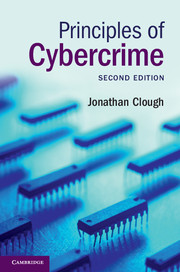Book contents
- Frontmatter
- Contents
- Preface
- Acknowledgements
- Table of Legislation
- Table of Cases
- List of abbreviations
- Part I Introduction
- Part II Computer as target
- Part III Fraud and related offences
- 7 Fraud
- 8 Criminal copyright infringement
- 9 ‘Spam’
- Part IV Content-related offences
- Part V Offences against the person
- Part VI Jurisdiction
- Bibliography
- Index
9 - ‘Spam’
from Part III - Fraud and related offences
Published online by Cambridge University Press: 05 October 2015
- Frontmatter
- Contents
- Preface
- Acknowledgements
- Table of Legislation
- Table of Cases
- List of abbreviations
- Part I Introduction
- Part II Computer as target
- Part III Fraud and related offences
- 7 Fraud
- 8 Criminal copyright infringement
- 9 ‘Spam’
- Part IV Content-related offences
- Part V Offences against the person
- Part VI Jurisdiction
- Bibliography
- Index
Summary
Electronic junk mail
It is the sense of Congress that … Spam has become the method of choice for those who distribute pornography, perpetrate fraudulent schemes, and introduce viruses, worms, and Trojan horses into personal and business computer systems.
No one with an email account could fail to be aware of the problem of unsolicited emails; more commonly known as ‘spam’. ‘[I]gnored by most and reviled by some’, the volume and sophistication of spam is such that it has gone from ‘being a minor nuisance to becoming a significant social and economic issue’. Modern communication networks provide spammers with a potential global audience of millions at negligible cost, giving rise to a number of significant concerns.
First, spam undermines the convenience and efficiency of email for legitimate users. Filtering software is imperfect and may return false-positives. Wanted emails may be blocked or ‘lost, overlooked, or discarded’ amidst the larger volume of spam. The numbing barrage of internet advertising and fear of internet scams may create a general sense of distrust of electronic commerce. The use of forged email addresses may lead to legitimate server operations being blacklisted by anti-spam services, or the unwitting owner of the spoofed address being bombarded by thousands of bounced messages. Although primarily associated with email, spam is becoming increasingly prevalent in other networks; for example, the sending of spam via SMS/MMS and social networking sites. In 2013 users of the image sharing site ‘Pinterest’ had their accounts used to send ‘work-at-home’ spam to linked Facebook and Twitter accounts. As at March 2013, just over 4 per cent of spam reports and complaints to the Australian regulator related to SMS.
Secondly, although improved filtering software has reduced the amount of spam that actually finds its way into inboxes, managing that level of spam is a considerable imposition on ISPs and network administrators, the cost of which may ultimately be passed on to consumers. Even with effective filtering software, some spam does get through, requiring users to spend time reviewing and discarding them. Apart from the waste of time and, in a commercial context, lost productivity, there may be direct financial costs where the cost of internet access is based upon time, or the amount of data downloaded. This is a particular problem in developing countries, which often rely on expensive satellite connections and/or have limited bandwidth.
- Type
- Chapter
- Information
- Principles of Cybercrime , pp. 272 - 286Publisher: Cambridge University PressPrint publication year: 2015



